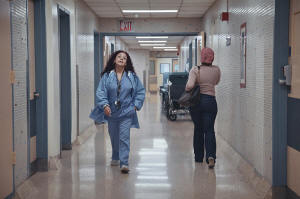Foreign medical residents fill critical positions at US hospitals, but
are running into visa issues
[July 05, 2025]
By ADITHI RAMAKRISHNAN and DEVI SHASTRI
Some hospitals in the U.S. are without essential staff because
international doctors who were set to start their medical training this
week were delayed by the Trump administration's travel and visa
restrictions.
It's unclear exactly how many foreign medical residents were unable to
start their assignments, but six medical residents interviewed by The
Associated Press say they’ve undergone years of training and work only
to be stopped at the finish line by what is usually a procedural step.
“I don’t want to give up,” said a permanent Canadian resident who
matched to the University of Pittsburgh Medical Center Harrisburg but
had her visa denied because she is a citizen of Afghanistan. She
requested to remain anonymous for fear of reprisal. “But the situation
also seems so helpless.”
Initially, the medical community was worried that hundreds of positions
— many in hospitals in low-income or rural areas of the U.S. — could be
affected. The pause on interviews for J-1 visas for approved work or
study-related programs was lifted in mid-June.
The national nonprofit that facilitates the residency match process said
the visa situation is resolving, but it will take weeks to know with
confidence how many medical residents have had the start of their
careers derailed because they got their visa too late or were blocked by
President Donald Trump’s travel ban on 12 countries, according to people
who coordinate the residents’ training.

Four foreign medical residents told the AP that U.S. embassies have been
slow to open up interview slots — and some have not opened any.
“You lose out on the time you could have used to treat patients,” said
one resident from Pakistan, who matched to an internal medicine program
in Massachusetts and requested to remain anonymous for fear of reprisal.
Thousands of foreign medical residents fill gaps in U.S. hospitals
The U.S. is projected to face a physician shortage in the next 11 years,
per the Association of American Medical Colleges, and foreign medical
residents fill critical gaps in the health care system. More than 6,600
foreign-born international medical residents matched into U.S. programs
in 2025 — the highest on record — and another 300 filled positions that
were vacant after the match process was complete.
Not all of those residents were affected by visa issues or the travel
ban on foreign nationals from countries including Afghanistan, Haiti and
Sudan.
International medical graduates often take jobs in places where U.S.
medical trainees tend not to go, said Donna Lamb, president of the
National Resident Matching Program.
“It’s not just that they’re coming in and they want to work in big,
flashy centers on the coast,” Lamb said. “They’re truly providing health
care for all of America.”
Foreign medical residents work in specialties that U.S. applicants
aren't as eager to apply to. For example, international candidates make
up almost 40% of residents in internal medicine, which specializes in
the prevention and treatment of chronic conditions like diabetes and
heart disease.
“The residents are the backbone of the entire hospital,” said Dr. Zaid
Alrashid from Brookdale University Hospital and Medical Center in New
York, which has medical residents from almost every continent. Most
received their visas prior to the pause but a few were caught up in
delays.
[to top of second column]
|

Medical staff walk through a hallway at Brookdale University
Hospital and Medical Center on Tuesday, July 1, 2025, in the
Brooklyn borough of New York. (AP Photo/Andres Kudacki)
 Two residents from India who spoke
on condition of anonymity have not been able to get an appointment
at any U.S. embassies there despite the J-1 visa pause being lifted.
Another resident from Egypt just secured a visa appointment for
mid-August but is worried her program may not be willing to wait for
her. She’s already paid her security deposit for an apartment in
Texas to live during her residency.
"I don’t know when this situation will be resolved,” said the
resident, who spoke on condition of anonymity, adding she hasn’t
been eating or sleeping well.
Hospitals waiting for residents to arrive
In California, leaders at two graduate medical education programs
said they have a small number of residents caught up in J-1 visa
delays. Both spoke on condition of anonymity due to concerns for the
doctors who are still trying to get visas.
A residency leader at one large health care system said two doctors
in its 150-resident program are delayed, adding they could start
late or defer to next year. A 135-person program at a California
public health system told the AP that one resident has yet to
arrive, though he was finally scheduled for a visa interview.
“We are not going to breathe easy until he's here in our hospital,”
the second leader said.
As of Wednesday, Lamb's matching program had received fewer than 20
requests to defer or cancel residency contracts.
Worried about losing their spots if they defer, many foreign medical
residents may keep trying to get to the U.S. and start their
residencies late, said Dr. Sabesan Karuppiah, a past member of the
American Medical Association's International Medical Graduates
Governing Council and former director of a large residency program.

Some hospitals may struggle at this point to replace the residents
who don't make it, leaving fewer people to care for the same number
of patients, said Kimberly Pierce Burke, executive director of the
Alliance of Independent Academic Medical Centers.
Foreign medical trainees who've made it into the U.S. remain on edge
about their situations, Karuppiah said.
“I can tell you the word on the street is: ‘Do not leave the
country,'” he said, adding that people are missing out on important
events, seeing sick parents or even getting married. “Everybody's
scared to just leave, not knowing what's going to happen.”
All contents © copyright 2025 Associated Press. All rights reserved
 |